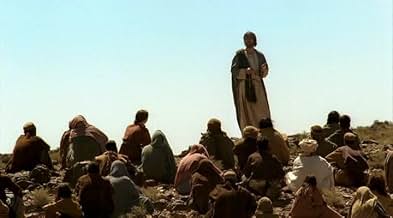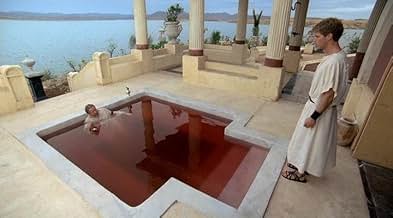AVALIAÇÃO DA IMDb
6,2/10
2,3 mil
SUA AVALIAÇÃO
Nomeado chefe da guarnição romana, o ambicioso Messala trai Judah Ben Hur, seu amigo de infância, deixando-o ser preso e condenado por um crime que não cometeu. Mas o destino irá encarregar-... Ler tudoNomeado chefe da guarnição romana, o ambicioso Messala trai Judah Ben Hur, seu amigo de infância, deixando-o ser preso e condenado por um crime que não cometeu. Mas o destino irá encarregar-se de dar a Ben Hur a oportunidade de se vingar.Nomeado chefe da guarnição romana, o ambicioso Messala trai Judah Ben Hur, seu amigo de infância, deixando-o ser preso e condenado por um crime que não cometeu. Mas o destino irá encarregar-se de dar a Ben Hur a oportunidade de se vingar.
- Prêmios
- 3 vitórias e 1 indicação no total
Explorar episódios
Avaliações em destaque
I am a huge fan of the 1959 film so I thought I would give a the miniseries a go. Throughout most of its run time it is a engaging retelling of the tale that focuses more on the political machinations that Ben-Hur (could have) does (done) especially in terms of the Roman court. Add in a lot more sexuality and less grand more earthly production values and the resulting adaptation plays like an engaging Game of Thrones episode while Christ story, more human and less religious, plays in the background. It is all very good fun. I especially like how Judah's time in Rome is flesh-out more and how the Great Sea Battle was more tactical. The lower budget forced a lot of the choices to make the story more psychological and grittier but it's nice counterpoint to the 1959 classic.
There is, however, two areas of concern. First because the film greatly down plays the religious (divine) elements a huge part of the ending does not make much sense; I think it would be incomprehensible how a certain "cure" happens without seeing the 59' version first. It also annoyed me that Christ's "forgive them they know not what they do" is ripped from its context completely and it is thematically problematic to have Judah the recipient of that utterance. Second, Morgan is miscast; his sandy blond hair and blue eyes reminder you too much of Heston and make Judah seem even less Jewish than in the 59' version. After about 30 minutes you get use to it and Morgan becomes an engaging hero but it is initially very distracting.
The chariot race in this version is no where near as grand, but it is still very exciting and the stripped down more documentary feel to it gives it a neat visceral edge. I'm not sure why they didn't cut the number of horses down to 2 per chariot through. I think that would have fit the paired down more earthly tone of this version.
The 59' is the gold standard of this story. The 25' is more religious version. But 2010 is the political intrigue version. Good stuff
There is, however, two areas of concern. First because the film greatly down plays the religious (divine) elements a huge part of the ending does not make much sense; I think it would be incomprehensible how a certain "cure" happens without seeing the 59' version first. It also annoyed me that Christ's "forgive them they know not what they do" is ripped from its context completely and it is thematically problematic to have Judah the recipient of that utterance. Second, Morgan is miscast; his sandy blond hair and blue eyes reminder you too much of Heston and make Judah seem even less Jewish than in the 59' version. After about 30 minutes you get use to it and Morgan becomes an engaging hero but it is initially very distracting.
The chariot race in this version is no where near as grand, but it is still very exciting and the stripped down more documentary feel to it gives it a neat visceral edge. I'm not sure why they didn't cut the number of horses down to 2 per chariot through. I think that would have fit the paired down more earthly tone of this version.
The 59' is the gold standard of this story. The 25' is more religious version. But 2010 is the political intrigue version. Good stuff
if you ignore the parallel with the adaptation from 1959. because it is different. for the accent on ordinary people situation. beautiful cinematography, decent acting. and new nuances of a story who seems be well known but who becomes more seductive from a specific angle. because it tries to be different. not only for escape from comparisons but for the desire to give a nuanced message. not religious in significant measure. but interesting. and, maybe, useful for a new public.
The 1959 version of "Ben-Hur" is without a doubt one of the truly great motion picture epics, so it was with surprise, and dismay, that I saw this 2010 re-make mini series appear on my local TV channel, and against my better judgment started to watch, what could only be, this travesty. To my surprise I found within 30 minutes I was totally hooked and engrossed by a deeply touching and superior Television experience. What it lacks in sheer magnificence of the 1959 version, it more than makes up in the human story of a family torn apart by terrible misfortune and fate. Wisely the makers chose a superb young cast in the leads, with Joseph Morgan (as Ben-Hur) and Stephen Campbell Moore (as Messala) not only doing justice to these epic characters but imbuing them with true human emotions. The story is very much the same as the original, and even though it was said the makers played down the religious aspect, I personally found that by doing this they actually heightened it in some respects to truly wonderful effect, especially during the last hour of the story which left this viewer with more than a few tears in his eyes. Naturally the sexual aspect is more explicit, but if one watches the original 1925 silent version you realize that is is something which has always been there but left and only implied in the 1959 version. The famous chariot race of the 1959 version can never be duplicated and the film makers obviously did not have the budget or tried to do so, but apart from that, if you have the opportunity to see this version, do yourself a favor and do so. I think, like me, you will be pleasantly surprised.
Some movies are so good that they leave no room for eventual remakes. Even so, there are attempts. This is a movie intended for TV and that plays the story of Lew Wallace on the revenge of Judah Ben-Hur. The plot is too well known, so I will not talk about it. The film has a naturally lower budget than its predecessor of 1959 and puts entirely aside any epic ambition, to the detriment of a close reading of historical truth. So we don't have a grandiose scenario or thousands of extras, but a very realistic scenario with some ambitions of historical truth and very similar to what we could see in the Middle East during the life of Jesus. It's evident the influence that "Ben-Hur" (1959), "The Passion of the Christ" or the TV series "Rome" had in the building of the scenarios and environments. The visual and special effects are quite realistic but manage to be discreet enough for the audience to keep their attention on the plot. Joseph Morgan was a very satisfying Ben-Hur and has good chemistry with Emily VanCamp and Lucía Jiménez. Stephen Campbell Moore and Ben Cross also don't disappoint. Overall, the cast was OK. To summarize: without having the ambition of a cinema masterpiece, this is a good TV movie, divided into two parts that, together, would have approximately three hours long. It's not an epic, but it never had that ambition. It's a movie for entertainment and it works well if we watch in that light.
Judah Ben-Hur (Joseph Morgan) is a rich Jewish merchant in Jerusalem. He, his sister Tirzah (Kristin Kreuk) and Roman commander Messala (Stephen Campbell Moore) were childhood friends. Ambitious Messala returns from Rome pushing Judah to inform on the Jewish revolt. He tries to stop the demonstration. He gets betrothed to Esther (Emily VanCamp). While the Governor of Judaea Pontius Pilate (Hugh Bonneville) marches in, a tile falls onto him and starts a riot. Messala is demoted. Judah is sent into slavery and encounters Jesus Christ on his way to the crucification. He is pressed into rowing a gallery where he rescues Roman admiral Quintus Arrius (Ray Winstone) after a battle. Arrius adopts him naming him after his dead son Sextus Arrius. He returns to avenge Tirzah and his mother Ruth (Alex Kingston).
This is a solid TV mini-series. There are some great actors. The younger leads are mostly TV stars. Joseph Morgan has more youth but not quite the presence of Charlton Heston. The big action is compensated by the modern CGI. The gallery scene works well. The chariot scene is less epic. I like some of the early exposition laying out the political situation. This series may not be necessarily but it is an interesting addition to the '59 classic.
This is a solid TV mini-series. There are some great actors. The younger leads are mostly TV stars. Joseph Morgan has more youth but not quite the presence of Charlton Heston. The big action is compensated by the modern CGI. The gallery scene works well. The chariot scene is less epic. I like some of the early exposition laying out the political situation. This series may not be necessarily but it is an interesting addition to the '59 classic.
Você sabia?
- CuriosidadesWas initially set to air in the USA on ABC, presumably in 2010, but did not premiere there until 2013 on Ovation.
Principais escolhas
Faça login para avaliar e ver a lista de recomendações personalizadas
- How many seasons does Ben Hur have?Fornecido pela Alexa
Detalhes
- Data de lançamento
- Países de origem
- Centrais de atendimento oficiais
- Idioma
- Também conhecido como
- Бен Гур
- Locações de filme
- Empresas de produção
- Consulte mais créditos da empresa na IMDbPro
Contribua para esta página
Sugerir uma alteração ou adicionar conteúdo ausente






































